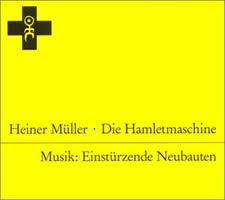Einstürzende Neubauten’s Die Hamletmaschine
|
Walt Mundkowsky [June 2004.]
Heiner MÜLLER: Die Hamletmaschine. Musik: EINSTÜRZENDE NEUBAUTEN. Blixa Bargeld (Hamlet), Gudrun Gut (Ophelia), Rundfunk der DDR. Ego / Rough Trade 111 (1991) [31:48]. Noise rockers Einstürzende Neubauten got the chance to record Die Hamletmaschine for East German radio in 1990. It became the debut release on Ego, the label created for their soundtrack work. Only listeners wanting Heiner Müller’s postmodern cut-up auf deutsch should apply (no notes), but it can help locate what attracted Aperghis to the text. Die Hamletmaschine (1977) is likely Müller’s best-known play. No Shakespeare buff, he regarded Hamlet as “much more a German than an English character … the intellectual in conflict with history.” The six pages of monologues and stage directions incorporate alien routines (the cosmic malcontent griping about what’s on TV) and the affected language is borrowed Artaud. (Lynette “Squeaky” Fromme has the final say.) This Hamlet is a bag of odd bits. “I was Hamlet,” he starts, later admitting, “I’m not Hamlet. I don’t take part any more.” He wishes he were a machine — “no pain no thoughts” — but Müller would seem to deny even that. “I am neither a dope — nor a hope — dealer,” he said in an interview. It’s easy to imagine the bleak prognosis and junkyard aesthetic appealing to the band. I’m more impressed by some of their decisions. The opening suggests a mistracking player — workshop percussion frequently interrupted, then overlaid with a jumble of voices. A few elements (slammed buckets, low-end piano notes, electronic pedal points, machine wails) circulate on various tasks, but avoid interacting with the rhythms of Hamlet’s speech. The extreme imagery (“I retreat into my entrails. I take my seat in my shit, in my blood”) goes past on its own at the climax. Only Ophelia’s scenes receive true accompaniment. Behind her Electra imitation (“Down with the happiness of submission”) a basso continuo of fuzz and whine leaves room for creeping (and creepy) repeated-note guitar torture. Frontman Blixa Bargeld’s possession of this Hamlet (or vice versa) is the entire show. He has sizable acting experience; even so, I’m startled by how much better Hamletmaschine performs than it reads. The initial utterance (Ich war Hamlet, et seq.) nails the sarcasm of a private person for the corrupt ceremony over a dead father he feared — Müller’s closest brush with the original. Elsewhere he ranges widely in pace and volume, moving the beef to Planet Bargeld. Dry ranting on Ich bin nicht Hamlet conjures up a dictator at bay. The dark alto of Gudrun Gut isn’t the brittle, hectoring Ophelia I pictured, but she fits into the scheme well enough. Every word of the play is here; another voice recites the directions. When Ophelia laughs on the page, it’s read out but no laugh proceeds. Changes in perspective and soundstaging resemble film edits and heighten the schizoid nature of the enterprise. No indexing for the five sections, alas. Einstürzende Neubauten was formed in 1980. A fine entry point is the Strategies Against Architecture double-disc sets — 1980-83, 1984-90, 1991-2001. Selection and sequencing are thoughtful, and each pack boasts non-album rarities. (The Hamletmaschine score was adapted from Bildeschreibung, an earlier Müller effort. It’s on II and nowhere else.) Like any ensemble still creative in its 25th year, Einstürzende Neubauten isn’t static. Ende Neu (End-New, 1996) saw a shift of focus — less assaulting, not less of a test. Silence Is Sexy (2000) goes further, with greater success. The follow-up, Perpetuum Mobile, came out in February. I’m still digesting it, with pleasure. The group’s website, http://www.neubauten.org/, has a useful collection of reviews of the new album. They add a line to one: “But if anyone understands what this reviewer means, please let us know?” Bargeld also sports a stylish site: http://www.blixa-bargeld.com/.
[More Walt Mundkowsky]
[More
Einstürzende Neubauten, Müller]
[Previous Article:
The Red Toucan Story, then and now]
[Next Article:
Georges Aperghis and Die Hamletmaschine]
|
